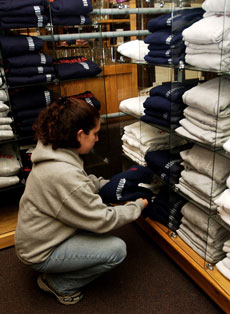Bad football season impacting sales

Online Poster
November 16, 2004
As the Illini football remains mired in a losing season, local merchants selling Illini gear are faced with the possibility that their merchandise won’t sell.
Cory Shumand, manager of Gameday Sports, 519 E. Green St., said a losing season could seriously impact his business.
“I can without hesitation say that yes, it does have an effect,” Shumand said. “We make no secrets about it, wins and losses are the main economic factor we face every fall. I’m sure everyone else in our industry feels the same way.”
However, Shumand said it was difficult to say if a particular type of merchandise is hurt. Instead, he said it usually depends on what sport is not performing well.
“It’s tough to pinpoint a specific category that takes a hit, but it’s easy to say that Illini football merchandise is hurt,” he said. “That’s what slows down in a losing season.”
Get The Daily Illini in your inbox!
Shumand also said it is difficult to prepare for a bad season.
“We’re working in an industry where a lot of what you want to sell has to be ordered a year ahead,” he said. “Our strength at Gameday is our ability to adjust.”
Once it’s clear that it won’t be a good season, Shumand said there are still a few things stores can do, including featuring other items and discounting the affected items.
“You prepare for the best and then you can scale down your inventory if the season goes wrong,” Shumand said.
Other stores agreed that a team’s performance would affect merchandising sales. June Savage, assistant general manager of the Illini Union Bookstore, said a good season can do wonders for a store.
“I would say that when the football team is doing very well it does help sales, but I hesitate to say the opposite is also true,” Savage said.
Savage said instead of ordering merchandise based on the team’s expected performance, she makes her orders based on whom the Illini are facing at home.
“I order merchandise considering who we are playing in home games. Typically, playing Michigan brings in a little more volume than, say, Indiana,” she said.
Shumand agreed, saying he orders merchandise for home games.
“We had an unusual schedule,” he said. “We started out with four straight home games, so we ordered enough to get through these games and then hoped we could track down enough merchandise to get us through the rest of the season.”
The problem is compounded by the fact that even if the basketball team has a good season, retailers can’t rely on that to pick up the slack.
Greg Baumer, department manager of TIS Bookstore, 707 6th St., said that since basketball has a more constant fan base and games that take place after his store closes, he needs a large increase in demand to make up for a bad football season.
“Basketball will never make up for a bad football season, unless they go very far,” Baumer said. “If the basketball team goes to the Final Four, you’ll make up for it in a big hurry.”
Marty Kaufmann, assistant athletic director for the University, said a poor season usually wouldn’t hurt the University itself.
“Our merchandise is still very visible, it’s out there,” Kaufmann said. “If you have lower attendance, then you’ll get lower sales just because no one’s there. But the gear still gets out there, people still wear the orange.”
Kaufmann said he thought merchandising sales were linked to attendance, not the team’s performance. However, Kaufmann did say attendance was linked to performance.
Shumand said even if a store examines the coming season, they could never fully anticipate how it will go.
“I wish we could predict how a season was going to go,” he said. “We didn’t go into this season thinking it was going to be this bad.”






